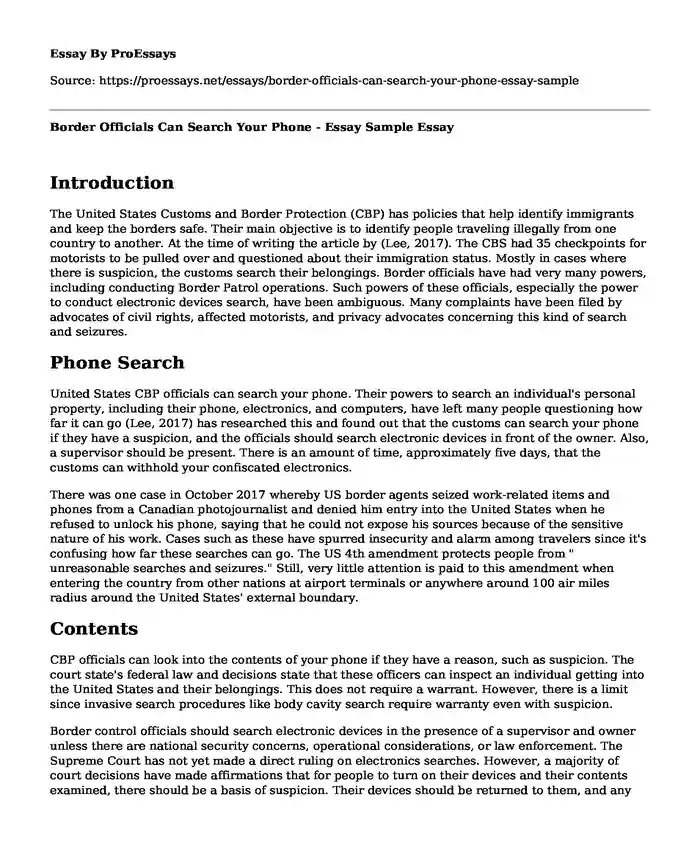Introduction
The United States Customs and Border Protection (CBP) has policies that help identify immigrants and keep the borders safe. Their main objective is to identify people traveling illegally from one country to another. At the time of writing the article by (Lee, 2017). The CBS had 35 checkpoints for motorists to be pulled over and questioned about their immigration status. Mostly in cases where there is suspicion, the customs search their belongings. Border officials have had very many powers, including conducting Border Patrol operations. Such powers of these officials, especially the power to conduct electronic devices search, have been ambiguous. Many complaints have been filed by advocates of civil rights, affected motorists, and privacy advocates concerning this kind of search and seizures.
Phone Search
United States CBP officials can search your phone. Their powers to search an individual's personal property, including their phone, electronics, and computers, have left many people questioning how far it can go (Lee, 2017) has researched this and found out that the customs can search your phone if they have a suspicion, and the officials should search electronic devices in front of the owner. Also, a supervisor should be present. There is an amount of time, approximately five days, that the customs can withhold your confiscated electronics.
There was one case in October 2017 whereby US border agents seized work-related items and phones from a Canadian photojournalist and denied him entry into the United States when he refused to unlock his phone, saying that he could not expose his sources because of the sensitive nature of his work. Cases such as these have spurred insecurity and alarm among travelers since it's confusing how far these searches can go. The US 4th amendment protects people from " unreasonable searches and seizures." Still, very little attention is paid to this amendment when entering the country from other nations at airport terminals or anywhere around 100 air miles radius around the United States' external boundary.
Contents
CBP officials can look into the contents of your phone if they have a reason, such as suspicion. The court state's federal law and decisions state that these officers can inspect an individual getting into the United States and their belongings. This does not require a warrant. However, there is a limit since invasive search procedures like body cavity search require warranty even with suspicion.
Border control officials should search electronic devices in the presence of a supervisor and owner unless there are national security concerns, operational considerations, or law enforcement. The Supreme Court has not yet made a direct ruling on electronics searches. However, a majority of court decisions have made affirmations that for people to turn on their devices and their contents examined, there should be a basis of suspicion. Their devices should be returned to them, and any copies of the device information destroyed when the investigation is over.
Conclusion
Search by customs and border officials on people's electronic devices should be limited to whenever there is reason, such as suspicion. The device owners should have a say exposing sensitive information related to work, provided that it is not illegal businesses or terrorism. This article has brought light on border searches' ongoing conditions, mostly the extent of CPS search powers, especially over electronic devices.
Works Cited
Lee G. P. (2017) Can US Customs and Border Officials Search your Phone? TED-Ed Blog. https://blog.ed.ted.com/2017/03/14/can-us-customs-and-border-officials-search-your-phone-these-are-your-rights.
Cite this page
Border Officials Can Search Your Phone - Essay Sample. (2023, Dec 12). Retrieved from https://proessays.net/essays/border-officials-can-search-your-phone-essay-sample
If you are the original author of this essay and no longer wish to have it published on the ProEssays website, please click below to request its removal:
- The Consequences of the Internet Essay
- Montgomery College Should Allow Gun On Campus - Controversial Essay
- The 4th and 5th Amendments: The Bedrock of Evidence Law
- Essay Example on Criminal Justice System: Media's Role in Informing Society
- Free Essay Sample on Appealing a Court Sentence: When Is it Permissible
- Essay Sample on secure Computer Forensics: Investigator & Crime Lab QA/QC
- Bureaucracy in Kafka's Novel - Book Review Sample







